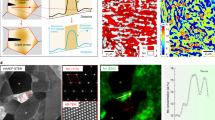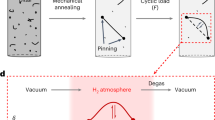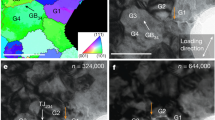Abstract
THE cause of hair-line cracks in low-alloy steels has been debated for many years. The main hypotheses now current can be reduced to the following : the hydrogen-pressure hypothesis and the residual stress hypothesis. It follows from the former that hydrogen alone can induce hair-line cracks to form ; and from the latter that, in the absence of residual stress, no hair-line cracks will form even if hydrogen is present.
This is a preview of subscription content, access via your institution
Access options
Subscribe to this journal
Receive 51 print issues and online access
$199.00 per year
only $3.90 per issue
Buy this article
- Purchase on Springer Link
- Instant access to full article PDF
Prices may be subject to local taxes which are calculated during checkout
Similar content being viewed by others
References
Dana, A. W., Shortsleeve, F. J., and Troiano, A. R., J. Metals, 7, 895 (1955).
Petch, N. J., “Residual Stresses in Metals and Metal Construction” (Reinhold, 1954).
Houdremont, E., and Schrader, H., Stahl u. Eisen, 27, 653 (1941).
Author information
Authors and Affiliations
Rights and permissions
About this article
Cite this article
BARKER, A., WAINWRIGHT, A. Hair-line Cracks in Low-alloy Steels. Nature 177, 1136–1137 (1956). https://doi.org/10.1038/1771136b0
Issue Date:
DOI: https://doi.org/10.1038/1771136b0
Comments
By submitting a comment you agree to abide by our Terms and Community Guidelines. If you find something abusive or that does not comply with our terms or guidelines please flag it as inappropriate.



